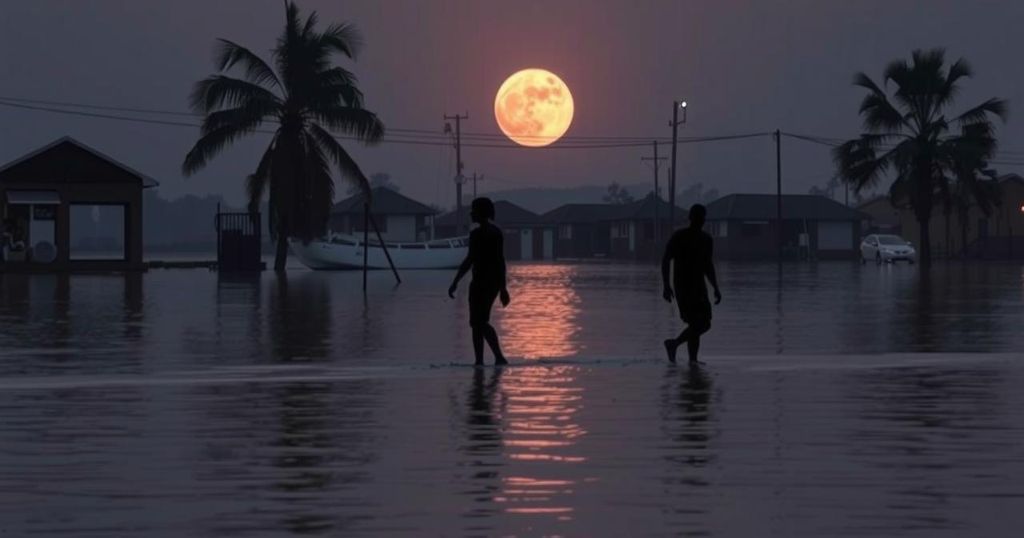Severe Flooding Crisis in Central and East Africa: A Call for Immediate Humanitarian Assistance

Severe flooding across Chad, Nigeria, and Cameroon has impacted over 2.7 million people, causing extensive damage to homes, farmland, and livestock. The humanitarian crisis calls for immediate funding, with Action Against Hunger urging $100 million for relief efforts. Climate change exacerbates this emergency, necessitating urgent multi-sectoral responses to safeguard affected populations.
The severe flooding in Chad, Nigeria, and Cameroon has led to catastrophic humanitarian challenges, affecting over 2.7 million individuals. In Chad alone, approximately 1.7 million people have been impacted, while Nigeria reports about one million and Cameroon over 230,000 affected residents. The torrential rains have inundated homes and agricultural fields, prompting Action Against Hunger to urge immediate funding and assistance for vulnerable populations in these regions. In Chad, relentless rains since late July have resulted in significant destruction across various provinces, including Lac, Mayo-Kebbi Est, Mandoul, and Tandjilé. The displacement of refugees from Sudan’s civil war into Sila province has further strained resources. The floods have already claimed the lives of over 500 individuals and devastated infrastructures, submerging more than 210,000 homes, destroying about 880,000 acres of farmland, and impacting nearly 70,000 livestock. This natural disaster exacerbates an already dire food insecurity situation, as 3.4 million people were already classified as acutely food insecure. Action Against Hunger’s Country Director in Chad, Gustave Gnagny, emphasized, “The affected populations are facing critical needs for food, drinking water, shelter, health and protection. According to initial estimates, nearly $100 million is needed to bring relief to these stricken populations. So far, barely 10% of this sum has been mobilized.” Nigeria is experiencing similar turmoil, particularly in the states of Borno, Adamawa, and Enugu, with tens of thousands left without adequate shelter or food. The flooding has greatly impacted Maiduguri, the capital of Borno state, where 50% of the area is submerged and around 414,000 residents are directly affected. This occurs against a backdrop of existing severe food insecurity encompassing over 32 million people across Nigeria. Thierno Samba Diallo, Country Director in Nigeria, stated, “The floods have damaged over 300,000 acres of farmland in Nigeria. The damage is likely to exacerbate food insecurity during the current lean season and in the months to come.” Meanwhile in Cameroon’s Far-North region, flooding has afflicted 236,000 individuals, resulting in the destruction of over 30,000 acres of crops. The potential outbreak of waterborne diseases poses an additional threat. Pascal Maillard, Country Director for Action Against Hunger in Cameroon, noted the urgent requirement for humanitarian efforts: “The priority needs are food, shelter and essential household items, as well as access to water, hygiene and sanitation. The general mobilization of the humanitarian community and donors is vital; the emergency is here.” The climate crisis is intensifying, with extreme weather events like the current floods becoming more frequent, undermining livelihoods across Chad, Nigeria, and Cameroon. Adapting to and mitigating the impacts of climate change remain critical for the long-term recovery of affected populations.
The region of Central and East Africa is increasingly facing severe flooding due to climate change, impacting agricultural production, drinking water access, and overall livelihoods. A substantial number of individuals in Chad, Nigeria, and Cameroon are grappling with the consequences of these climatic shocks. Action Against Hunger, since its establishment, has focused on supporting communities impacted by hunger, malnutrition, and lack of access to basic needs due to natural disasters and other crises. The necessary response to these crisis situations highlights the urgency for both immediate humanitarian aid and long-term strategic planning to address climate resilience.
In summary, the flooding crisis across Chad, Nigeria, and Cameroon represents an urgent humanitarian emergency affecting millions. With extensive damage to homes, farmland, and livestock, the call for immediate funding and assistance is paramount to address the needs of the most vulnerable populations. As climate issues continue to escalate, there is a pressing need for collective efforts from the international community to provide relief and develop adaptive measures for long-term sustainability in the affected regions.
Original Source: www.actionagainsthunger.org






